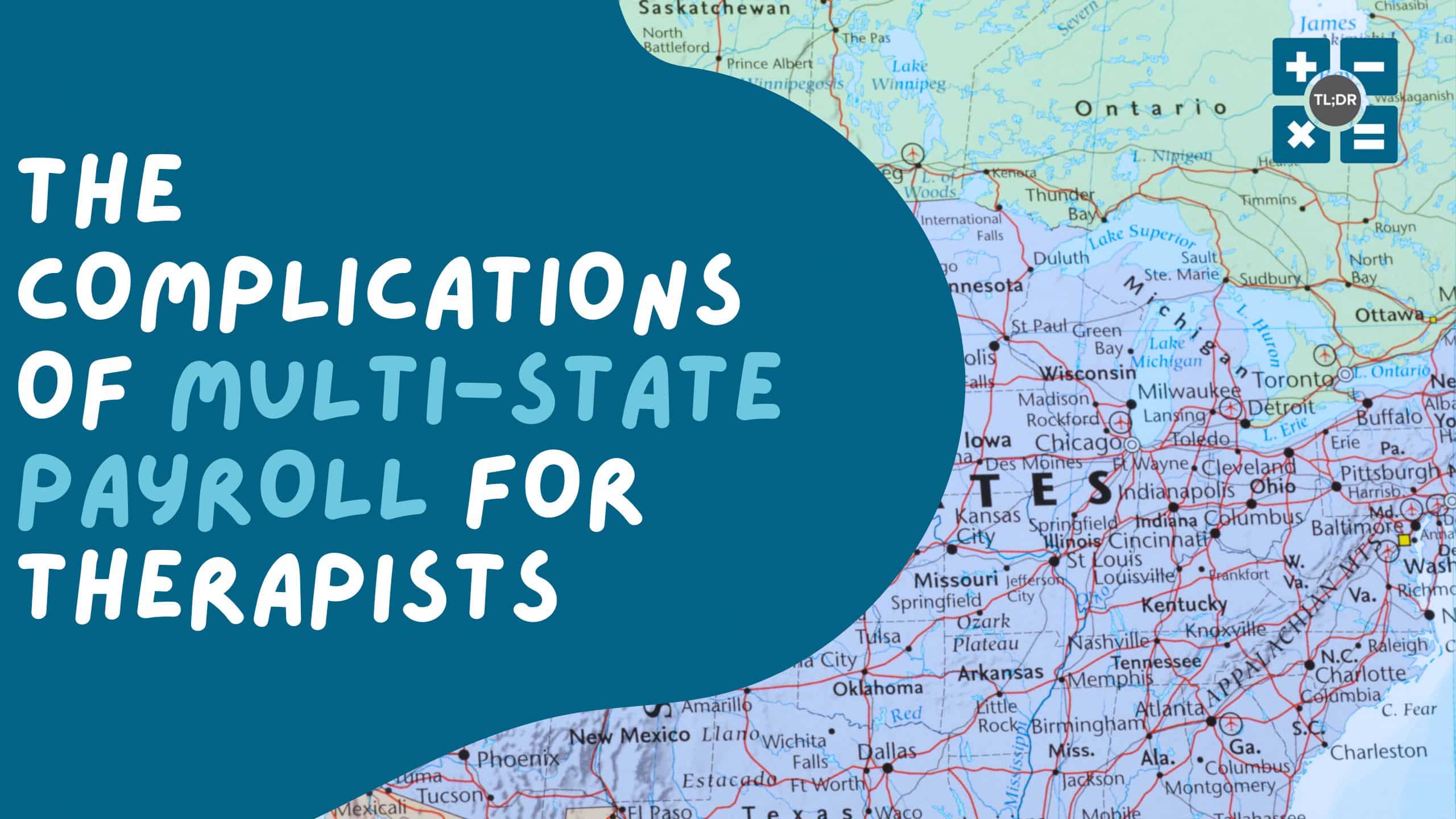Payroll gets messy when therapists cross state lines.
It’s bad enough tracking hours and cutting checks for your team, but throw in different state tax rules and labor laws, and suddenly, you’re drowning in compliance issues you never saw coming.
Each state wants its piece of the pie, and they don’t make it easy to figure out multi-state payroll for therapists.
You didn’t spend years in school learning how to help people just to stay up late; You are puzzling over which overtime rules apply when your clinician sees patients in three different states.
But that’s exactly where you’ve landed. And the stakes aren’t small—mess this up, and you’re looking at fines, penalties, and audits that can cripple the practice you’ve worked so hard to build.
Tax Compliance and Withholding
Tax rules are different across state lines, and therapy practices feel the pain more than most. States don’t coordinate their tax requirements, leaving you to figure out which state gets paid when your therapist sees clients in New Jersey but lives in Pennsylvania. Some states grab their share the minute your therapist connects to a telehealth call—office location be damned. Get it wrong, and you’re not just fixing a mistake—you’re paying penalties that eat into your bottom line fast.
Don’t mess around with multi-state tax compliance.
Grab a payroll system built to handle therapists who work across borders—something like Gusto or ADP that won’t choke when calculating different state withholdings. Register with each state tax department before you’re caught short, and get a tax pro who’s seen these issues before.
Trying to save a few bucks doing this yourself is penny-wise and pound-foolish—the first notice from a state you forgot will prove that real quick.
State-Specific Labor Laws
Labor laws are a patchwork nightmare for therapy practices spanning multiple states. California demands meal breaks after five hours while neighboring states couldn’t care less about when your therapists eat lunch. Some states require sick leave accrual from day one, others make you wait 90 days, and some don’t mandate it at all. And when does your therapist work remotely from their cabin in Vermont? You’re following Vermont’s rules, not the rules where your practice is based—a detail many practice owners learn the hard way.
Tackle this mess head-on, or pay for it later. Build state-specific employee handbooks that spell out exactly what applies where your people work—one size fits all is a recipe for lawsuits. Get an HR system that flags state requirements automatically because you won’t remember which state requires what when you’re running payroll at midnight. Find an employment attorney who’ll take your call when a therapist in Minnesota questions why their overtime doesn’t match what you pay in Texas. This isn’t the place to wing it or hope nobody notices your non-compliance.
Unemployment Insurance
Unemployment taxes hit therapy practices with a double whammy when working across state lines. Every state where your therapists see patients wants their SUTA contribution, each with different rates and filing deadlines that never seem to sync up. Miss a filing or underpay in one state, and you’re not just catching up—you’re paying penalties that can double or triple what you originally owed, all because your telehealth therapist saw three clients in Rhode Island last month.
Fix this before it becomes a crisis. Register for SUTA in every state where your therapists work—before they start seeing patients, not after your first notice of non-compliance shows up. Set calendar reminders for each state’s filing deadlines because they’re all over the map. Or better yet, partner with a payroll provider who specializes in healthcare practices and knows these gotchas cold. When SUTA management starts eating up too much of your admin time, that’s your sign to consider a PEO that can take this headache off your plate entirely.
Nexus Laws & Corporate Taxes
Nexus is that nasty tax trap most therapy practice owners never see coming. Hire one therapist who works from home in another state, and suddenly, that state’s tax department has their hand out for corporate income tax, franchise fees, and whatever else they can grab. Some states pounce the minute your therapist logs into their first telehealth session from their jurisdiction.
Don’t let nexus laws blindside your practice. Check each state’s definition of nexus before you hire therapists there—what triggers tax obligations in California won’t match the rules in Texas. Get a tax pro on board who actually understands multi-state therapy practices, not just the local tax code.
Workers’ Compensation Compliance
Workers’ comp rules change the minute you cross state lines, creating a compliance mess for therapy practices with multi-state staff. Some states demand coverage for even a single remote employee, regardless of whether they’ll ever set foot in your office. Skip this step,p and you’re gambling with uncapped liability when that therapist trips over their home office chair during a telehealth session.
Sort this out before hiring, not after someone gets hurt. Secure proper workers’ comp coverage in each state where your therapists live and work because your home state policy likely stops at the border. Find an insurance broker who knows the therapy field and can bundle multi-state coverage to save you from juggling policies across a dozen different carriers.
Let Us Handle Your Cross-Border Payroll Headaches
Managing payroll across state lines shouldn’t distract you from what matters most—helping your patients. Every hour spent untangling tax regulations is time away from growing your practice and supporting your clinical team.
At TL;DR Accounting, we specialize in multi-state payroll compliance for therapy practices like yours. Our team knows the specific challenges you face with telehealth and traveling clinicians.
Schedule a discovery call today and stop worrying about whether your multi-state payroll is compliant.





